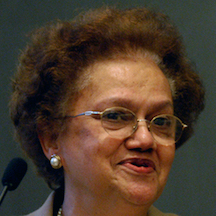 Shirley McBay, a pioneering mathematician, former professor and administrator at Spelman College in Atlanta, and the former dean of student affairs at the Massachusetts Institute of Technology, died late last month at her home in Los Angeles. She was 86 years old.
Shirley McBay, a pioneering mathematician, former professor and administrator at Spelman College in Atlanta, and the former dean of student affairs at the Massachusetts Institute of Technology, died late last month at her home in Los Angeles. She was 86 years old.
A native of Bainbridge, Georgia, she attended racially segregated schools. She excelled in her studies, particularly in mathematics. At the age of 15, she enrolled at historically Black Paine College in Augusta, Georgia. Dr. McBay graduated from college at the age of 19 with a degree in chemistry.
She then taught at Spelman College in Atlanta, while studying for master’s degrees in chemistry and mathematics at Atlanta University. She started doctoral studies at the University of Chicago but transferred to the University of Georgia to be closer to family.
After earning her Ph.D. from the University of Georgia, Dr. McBay returned to Spelman, serving as a professor and an administrator. She built up the college’s mathematics department, which she chaired, and established the college’s Division of Natural Sciences. In 1975, Dr. McBay accepted a position at the National Science Foundation. In 1980 she was appointed dean of student affairs at MIT and remained in that role until 1990. During this time. Dr. McBay told a congressional committee: “The worst intellectual crime one can commit is to prejudice one’s results, to prejudge how something will turn out. However, this is precisely what we are doing when we fail — from elementary school to graduate school — to encourage women and minorities to enter the fields of science and engineering.”
Dr. McBay later founded the Quality Education for Minorities (QEM) network in Washington, serving as its president for two decades. The organization advocates for female students and students of color by organizing conferences, providing guidance on how to apply for grants, locating internship opportunities at science organizations, and helping colleges and universities nationwide to better support their students from groups underrepresented in the STEM fields.

